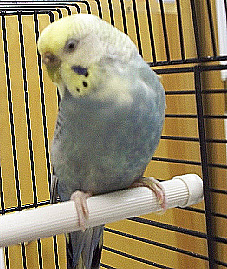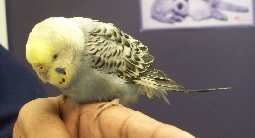Unlikely coincidences align to reunite parakeet with her owner

Topanga
Lyssa Alexander | Contributor
Topanga is a budgerigar (also called budgies or parakeets). These are the colorful little birds that you see in every pet store.
I have three budgies myself. Mine were given to me as un-socialized adults, which means that every time I come near them, they act like I’m going to kill them.
In my house, these birds are basically noisy fish. Unlike my birds, if budgies are socialized from a young age they can be exceptionally sweet and friendly. Topanga is nothing like my budgies; she thrives on attention and lives on shoulders. She is one of the nicest birds I have ever met.
I was first introduced to Topanga and her family in October of 2010. She was sick and required a minor surgical procedure. All throughout her treatment and recovery, she maintained her stellar attitude, and she recovered well from this incident.
On May 18, I met another budgie that was very affectionate. A family in Ypsilanti brought in a beautiful bird that a friend of theirs found hopping around on the street.
Budgies who get out of houses into the wild are very unlikely to survive. Unable to find the owners, they got her a home and brought her in to the vet. The young boy who adopted the bird had named her Lebron (he was not happy to hear that Lebron was a girl). She was in good shape.
On May 19, Topanga’s owners called me very upset. Topanga had gotten out of the house and disappeared two days earlier. Topanga’s owner was mainly just calling to get our assessment on how likely it was that she would ever return.
Unfortunately, when little birds get out of the house, they don’t often find their way back. However, we thought of Lebron and told her we would call her back.

"Lebron"
Lyssa Alexander | Contributor
We keep pictures of all our patients on file. I kept looking back and forth between Lebron and Topanga: same blue body, same yellow head, and same three dark spots on her cheeks. The lighting wasn’t the same, so it was hard to be sure, but they looked a lot alike.
When I finally heard back from Lebron’s owner, we asked the crucial question… where did your friend find her? Without any prompting he identified the very street where Topanga went missing! We were overjoyed.
The new owners were happy to return her (though they might be getting a new Lebron some time soon). I have never been so excited to make a phone call. Topanga got home on the 21st of May and is as happy as ever.
There were so many amazing coincidences that helped Topanga find her way home. She was a nice enough bird to let someone pick her up. Someone was kind enough to rescue her. They were also very responsible in bringing her to a vet for evaluation. They happened to pick us (what luck)! Topanga’s owner thought to call us.
When so many coincidences align for good, it is worth taking note of. In my profession I have seen my fair share of sad stories, and I have been there with many families as they lose their beloved pets. But this week I am celebrating the little birdie that found her way home.
Lessons from Topanga’s journey:
Wing clipping is advised for most pet birds. Some owners feel comfortable doing this at home, but many bring their birds to veterinarians with avian experience to have it done. The goal of wing clipping is to take away flight ability while maintaining the ability to glide down off of high perches.
When done correctly, wing clipping is a painless procedure. If a bird is fully flighted, they should only be given access to areas outside their cage if all fans are off, all doors are closed and someone is there to supervise.
Microchipping is available for a wide variety of species. A microchip is inserted under the pets’ skin and can be read with a scanner. Almost all veterinarians and rescue organizations have scanners and will routinely check lost pets for microchips. Animals who go missing are much more likely to find their way home if they have a microchip.
Budgie Care:
Housing:
Birds should be able to stretch out fully and move to multiple perches of different sizes. The biggest one should be at the highest point in the cage (this is where they will spend most of their time). They should be able to wrap their feet 3/4 of the way around the largest perch.
Their cage should not be housed in a kitchen or near a door that is opened frequently. The cage bottom should be lined with newspaper under a wire grate and should be changed every one to three days.
Lots of bird-safe toys should be provided, but avoid tents or huts that mimic nests. Budgies should not be given access to any cage material or toys that contain zinc or lead. You can add a lot of enrichment to your bird’s life by providing food items in interesting locations like inside toys.
Food:
At least 50 percent of a budgie’s diet should consist of pellets (Roudybush and Harrison’s are great choices). When they are offered only seed mixtures, they tend to pick out only their favorite parts (like eating all the M&M’s out of a trail mix). This can lead to obesity and other health problems over time.
A small amount of seed is acceptable for budgies, as are vegetables. Good veggies to try are sweet potato, carrots and dark leafy greens, but no single treat should be fed excessively. Several water bowls should be offered, along with one or two that are large enough to bathe in. These dishes should be cleaned and refilled daily.
Medical:
Birds are notorious for hiding their illness. They usually don’t show any signs until they are quite sick.
Keep your eyes open for a change in droppings, hunched posture, sitting on bottom of cage, fluffing of the feathers, breathing hard, heavy tail bobbing, crusting or discharge from the nose or other changes in posture or behavior.
I recommend weighing birds regularly with a food scale or postal scale. Changes in weight can be one of your earliest clues that you may have a problem.
Dr. Lyssa Alexander treats small and exotic animals and pocket pets at All Creatures Animal Clinic.


Comments
BookAnnie
Sat, Jun 4, 2011 : 12:59 a.m.
For lost pets, no matter what the pet, contact the Humane Society of Huron Valley or go on their website hshv.org to report your lost pet. Glad this had a happy ending!
bedrog
Fri, Jun 3, 2011 : 10:54 p.m.
actually , re the survival in the wild thing, Chicago has for decades had a feral monk parakeet colony (in the Hyde park area)...as does Austin texas. The birds live in communal colonires for warmth. Although in neither case is the species the same as the budgerigar..... Nice story./ending
goodthoughts
Fri, Jun 3, 2011 : 9:43 p.m.
What a wonderful ending to what could of been a sad story. Kudos to the owners, rescuers and you, the doctor who made it all happen